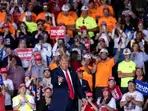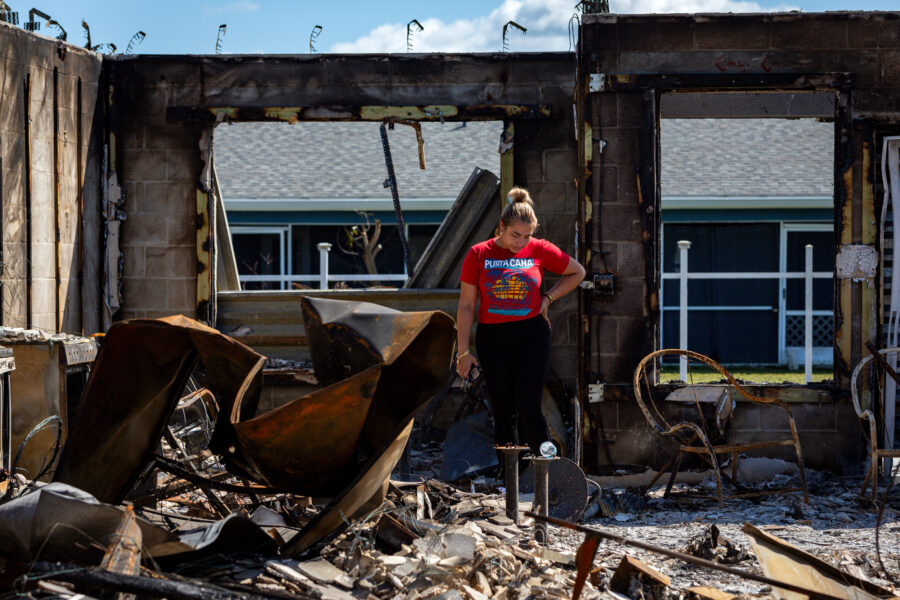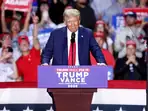After Niger’s coup, the drums of war are growing louder
NASSIROU MAHAMADOU, a vegetable seller perched on a stool in Niamey, the capital of Niger, does not look like a fighter. Yet at the mention of threats by Niger’s neighbours to use force to reinstate Mohamed Bazoum, the president who was ousted in a coup on July 26th, he swells with anger. “If they come here, we [civilians] are going to war alongside the army.” He is outraged that the Economic Community of West African States (ECOWAS), the regional bloc, is considering sending troops to battle the junta, even as it has done little to fight the jihadists that he says are the bigger threat. “ECOWAS has weapons to attack Niger but not to kill the terrorists,” he says. “It’s a disgrace.” 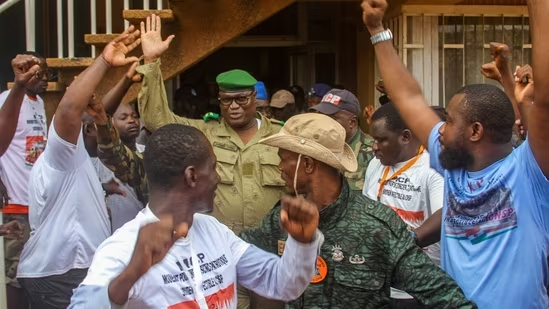 PREMIUM
PREMIUM
The regional bloc had threatened to use force if Mr Bazoum were not reinstated by August 6th. Yet as the clock ticked down to that deadline, the coup leaders showed no sign of giving up power. Instead, they filled a stadium with cheering supporters (pictured), who beheaded a rooster painted in the colours of France, the former colonial power. As the deadline day ended the junta closed Niger’s airspace altogether, claiming that two other African countries had been preparing troops for deployment to Niger. It said Niger’s armed forces were “ready to defend the integrity of our territory”. As this article was published ECOWAS appeared to be buying time by calling for an extraordinary summit on August 10th.
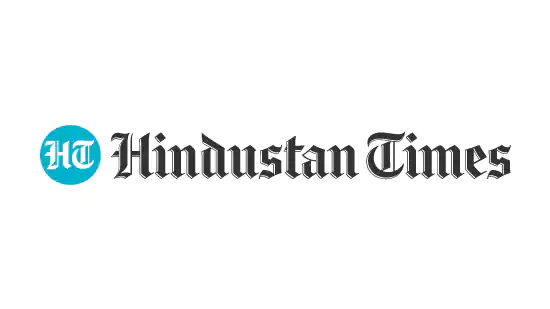
The rising tension highlights two related, and disturbing, trends in the region. The first is the rapid spread of jihadist terrorism over the past decade as groups affiliated with Islamic State and al-Qaeda have pushed into the Sahel, a desperately poor and arid region south of the Sahara. Among the worst affected places are the three core countries of the Sahel—Burkina Faso, Mali and Niger—where more than 10,000 people were killed in armed conflict last year. The second trend is the retreat of civilian rule as men in uniform have overthrown elected governments that had lost popular legitimacy because of their inability to end the jihadist terror. Since 2020 there have been coups in Burkina Faso and Mali (as well as Guinea and Chad, though for somewhat different reasons). In Burkina Faso and Mali, the putsches have been followed by a downward spiral of deteriorating security.
When Niger’s government became the latest to fall, many leaders in the region hoped to halt this contagion of coups, not least because left unchecked it might give ambitious generals in their own armies ideas. Among the most strident is Bola Tinubu, the recently elected president of neighbouring Nigeria and chairperson of ECOWAS. Because he was briefly detained by a junta in 1994 he detests putschists and is understood to want to make opposition to them a cornerstone of Nigeria’s foreign policy. Others in the region seem to agree. “It’s one coup too many,” said Aissata Tall Sall, Senegal’s minister of foreign affairs.
Hopes of a peaceful resolution to the crisis plunged on August 4th when an ECOWAS mediation team returned from Niger without having met either Mr Bazoum or General Abdourahamane Tchiani, the man who overthrew him. Later that day the defence chiefs of the region’s main powers said they had finalised plans for sending in a force. Benin, Guinea Bissau, Ivory Coast, Nigeria and Senegal all indicated they would contribute.
Yet the junta in Niger has allies of its own. The military rulers of Burkina Faso and Mali declared that they would consider any intervention in Niger to be a declaration of war on their own countries. Members of the Nigerien junta have also travelled to Mali where, according to Wassim Nasr, a journalist and researcher, they requested assistance from Wagner, a Russian mercenary group that has operated in Mali since 2021.
There seems to be little chance of either side backing down. ECOWAS, having drawn a line in the sand, would probably find it difficult to accept anything less than a full reinstatement of Mr Bazoum. And even if a fudge could be confected—perhaps involving the appointment of another civilian as the head of a transitional government and promise of elections—it would have to include the liberation of Mr Bazoum. Yet General Tchiani may see holding him as his best protection against another coup, or counter-coup, argues Nina Wilén of Lund University.
Even so, an ECOWAS invasion is not yet inevitable. War is “the option of last resort”, a high-level government official involved in deliberations in Abuja, the capital of Nigeria, told The Economist after the deadline had expired. The “junta has reached out to the Nigerian authorities through back channels” but whether these talks succeed “depends on what they bring to the table”, the official said. Moreover, he said Nigeria’s government was concerned by domestic opposition to a military intervention “especially in northern Nigeria with imams preaching against it”. On August 7th Niger’s prime minister, Ouhoumoudou Mahamadou, who is not in Niger, told a French television station that the junta had invited an ECOWAS delegation back for talks.
After a closed-door meeting of the Nigerian Senate, the body’s president, Godswill Akpabio, advised ECOWAS “to strengthen their political and diplomatic options”. Several reports suggest that a majority of senators at the meeting were against sending in troops. Under the constitution, Nigeria cannot deploy forces abroad without Senate approval unless there is an “imminent threat or danger” to national security.
ECOWAS has also struggled to win the support of other regional powers that share borders with Niger. Abdelmadjid Tebboune, Algeria’s president, said he was “categorically against any military intervention” which would be considered a “direct threat to Algeria”. Chad also opposes the use of force.
A key consideration for ECOWAS must surely be whether foreign troops would be welcomed or opposed by Nigeriens themselves. Canvassing by Premise Data, a polling firm, for The Economist in the first survey conducted since the coup found that 78% of respondents support the actions of the junta and that 73% think it should stay in power “for an extended period” or “until new elections are held”. A slim majority of 54% said they were not in favour of an intervention by regional or international organisations. Of those supporting foreign intervention, an alarming 50% said they preferred it to be by Russia, presumably because they think it would support the putschists, as Wagner has done in Mali. Just 16% chose America, 14% the African Union and a paltry 4% preferred ECOWAS. These findings are not representative of opinion across the country because Premise conducts its rapid polls using mobile phones, which can skew the sample. In this survey, most of the respondents were relatively well-educated men and 62% were in the capital. Even so, the poll provides an indicative snapshot of the prevailing mood.
There are other significant hurdles facing an ECOWAS force besides a lack of popular support. One is cost. “Nigeria is too broke to conduct this operation, so needs funding for it,” says Cheta Nwanze of SBM Intelligence, a research firm in Lagos. “But the West can’t afford to be seen as being involved.” France has said it supports efforts by ECOWAS to reinstate Mr Bazoum but has not said if its armed forces would back an ECOWAS intervention or whether its treasury would help fund the operation.
Moreover, an ECOWAS mission would be far more complex and risky than any the bloc has mounted in decades. In 2017 a Senegalese-led force moved against the longtime president of the Gambia, Yahya Jammeh, after he refused to accept the result of an election he had lost. He folded as soon as troops pressed in. Yet Niger is more than 100 times larger than the Gambia and it has a Western-trained army that seemingly supports the junta, which is holding its legitimate president hostage. A closer parallel might be Sierra Leone, where in 1997 a group of soldiers ousted the elected president during a civil war. Some eight months later, after the putschists allied with gang-raping rebels, ECOWAS forces rolled in, removed the coup leaders and reinstated the president. Although the mission was successful, the Nigerian-led force was accused of human-rights abuses and of bombing civilian targets.
Sending troops into Niger in a similar fashion would be “madness”, argues Yvan Guichaoua, a Sahel expert at the University of Kent. This is because it is too late to mount a targeted operation to free Mr Bazoum, while a wider war could further destabilise both Niger and northern Nigeria.
Mr Tinubu may hope that large parts of Niger’s army will refuse to fight if ECOWAS troops cross the border. Yet if they do resist, the region’s troops may find themselves stuck in a three-way fight between the junta’s forces and the jihadists. Even were an intervention to succeed in restoring Mr Bazoum, he could be perceived as a puppet of foreign forces. “I pray to God that Bazoum comes out of this alive,” says a former adviser in the presidency. Yet even he counsels against ECOWAS sending in troops. “It will destroy human life for nothing and sink our country into war.”
© 2023, The Economist Newspaper Limited. All rights reserved. From The Economist, published under licence. The original content can be found on www.economist.com
Experience unrestricted digital access with HT Premium
Explore amazing offers on HT + Economist Start 14 Days Free Trial Already Subscribed? Sign In
Disclaimer: The copyright of this article belongs to the original author. Reposting this article is solely for the purpose of information dissemination and does not constitute any investment advice. If there is any infringement, please contact us immediately. We will make corrections or deletions as necessary. Thank you.
Title:After Niger’s coup, the drums of war are growing louder
Url:https://www.investsfocus.com




